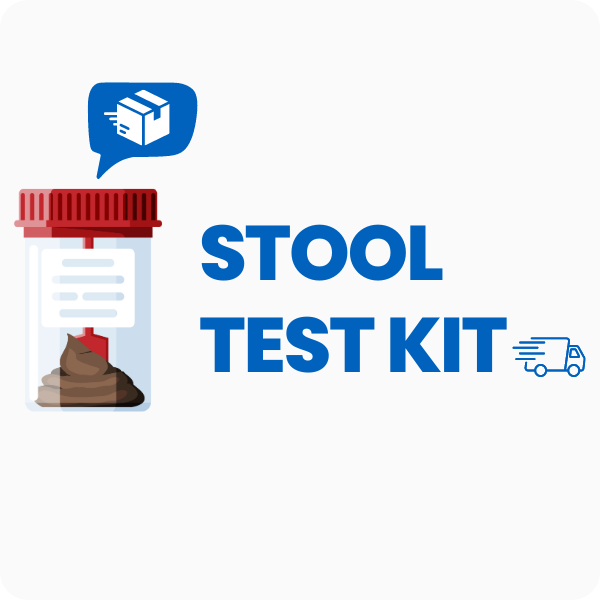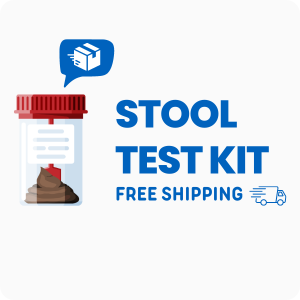Ordering the Comprehensive Stool Analysis + Parasitology by Doctor’s Data | Canada
The Comprehensive Stool Analysis + Parasitology by Doctor’s Data helps identify the root causes of digestive symptoms, such as bloating, diarrhea, constipation, and unexplained fatigue, by measuring key markers of digestion, absorption, inflammation, and the presence of harmful bacteria, yeast, and parasites. This test uses advanced methods to detect both common and less obvious gut imbalances, providing a detailed look at your digestive system. Interestingly, this test can also reveal hidden infections or imbalances that may not show up in standard stool tests, helping to guide more targeted treatment plans.
Ordering this test can help you:
- Pinpoint specific bacterial, yeast, or parasitic infections in the digestive tract
- Measure inflammation markers like calprotectin and lactoferrin for gut irritation
- Assess digestive enzyme levels, such as elastase, to check for pancreatic function
- Identify malabsorption of fats, proteins, and carbohydrates
- Determine the balance of beneficial and harmful gut flora
- Receive antimicrobial susceptibility results for targeted treatment options
Who Should Consider Digestive and Parasitic Stool Testing
People who have ongoing digestive discomfort, such as frequent bloating, loose stools, or stomach pain, may benefit from this test. For example, someone who has tried changing their diet and still experiences unpredictable digestive issues might find answers through this type of testing.
Ordering this test may also be helpful in these situations:
- Persistent gas or abdominal pain that does not improve with common remedies
- Unexplained weight loss or trouble gaining weight despite normal eating habits
- Recurring yeast infections or symptoms of Candida overgrowth
- Chronic fatigue that has not improved with rest or lifestyle changes
- Joint pain that seems unrelated to injury but may be linked to gut inflammation
This test is recommended for those who want to identify specific causes of digestive symptoms, such as infections, inflammation, or poor nutrient absorption, so they can address these issues directly. Delaying this test could mean missing the chance to catch treatable gut problems early, which may allow symptoms to continue or worsen over time.
How to Prepare for Digestive and Microbiome Stool Testing
Fasting is not required for this test, and you can eat and drink as usual before collecting your sample. Always follow any instructions provided by your doctor or healthcare practitioner to make sure your sample is collected and shipped correctly for the most useful results.
Labs Included When Ordering Your Comprehensive Stool Analysis + Parasitology
| Test Name | Reference Range | Significance | Low and High Levels of Comprehensive Stool Analysis + Parasitology |
|---|---|---|---|
| Digestive Function Markers | |||
| Elastase | >200 | Elastase is an enzyme made by the pancreas that helps break down proteins. It shows how well your pancreas is working to support digestion. | High levels mean your pancreas is producing more enzyme than needed, which is rare and usually not a concern.
Low levels mean your pancreas may not be making enough enzymes, which can cause poor digestion and nutrient absorption. |
| Fat Stain | Negative | This test checks for undigested fat in your stool, which can show if your body is absorbing fat properly. | High levels mean your body is not absorbing fat well, which can lead to nutrient deficiencies.
Low levels mean normal fat absorption. |
| Muscle Fibers | None to rare | Muscle fibers in stool show if your body is breaking down and absorbing protein from food. | High levels mean your body may not be digesting protein well.
Low levels mean normal protein digestion. |
| Carbohydrates | Negative | This marker checks for undigested sugars and starches, showing how well your body digests carbohydrates. | High levels mean your body is not digesting carbohydrates well.
Low levels mean normal carbohydrate digestion. |
| Inflammation and Immune Markers | |||
| Calprotectin | <50 | Calprotectin is a protein that shows if there is inflammation in your gut. It helps spot conditions like Crohn’s or colitis. | High levels mean there is inflammation in your digestive tract.
Low levels mean no sign of gut inflammation. |
| Lactoferrin | <7.3 | Lactoferrin is another marker for gut inflammation, especially from infections or inflammatory bowel disease. | High levels mean active inflammation, often from infection or IBD.
Low levels mean no active inflammation. |
| Lysozyme | <600 | Lysozyme is an enzyme that increases with certain types of gut inflammation, especially in Crohn’s disease. | High levels mean possible Crohn’s or other gut inflammation.
Low levels mean no sign of this type of inflammation. |
| sIgA | 510-2040 | Secretory IgA is an antibody that helps protect your gut from infections and supports immune defense in the digestive tract. | High levels mean your immune system is reacting to something in your gut.
Low levels mean your gut immune defense may be weak. |
| Blood and Cell Markers | |||
| Occult Blood | Negative | This test checks for hidden blood in your stool, which can be a sign of bleeding in the digestive tract. | High levels mean there may be bleeding in your gut.
Low levels mean no hidden blood detected. |
| Red Blood Cells | None | Red blood cells in stool can show irritation, injury, or bleeding in the digestive tract. | High levels mean possible bleeding or irritation.
Low levels mean no red blood cells found. |
| White Blood Cells | None | White blood cells in stool can show infection or inflammation in the gut. | High levels mean infection or inflammation is present.
Low levels mean no infection or inflammation detected. |
| Pollen | None | Pollen in stool can show if you are swallowing allergens, which may affect gut symptoms. | High levels mean you may be exposed to allergens.
Low levels mean no pollen detected. |
| Microbiome and Pathogen Markers | |||
| Bacteriology culture, aerobic | Normal flora | This test checks for the types and amounts of bacteria in your gut, including both helpful and harmful types. | High levels mean possible overgrowth of certain bacteria.
Low levels mean not enough helpful bacteria. |
| Yeast culture | None to rare | Yeast culture checks for the presence of yeast, such as Candida, which can cause digestive symptoms if overgrown. | High levels mean possible yeast overgrowth.
Low levels mean no yeast or normal levels. |
| Additional pathogens culture | None detected | This test looks for harmful bacteria and other pathogens that can cause infection or illness in the gut. | High levels mean infection with harmful bacteria.
Low levels mean no harmful bacteria found. |
| Parasitology, concentrate & trichrome | None detected | This test checks for parasites, such as Giardia or Cryptosporidium, which can cause digestive symptoms and illness. | High levels mean a parasite infection is present.
Low levels mean no parasites found. |
| Cryptosporidium | None detected | Cryptosporidium is a parasite that can cause diarrhea and stomach cramps, especially after travel or water exposure. | High levels mean infection with Cryptosporidium.
Low levels mean no infection found. |
| Ph | 6.0-7.8 | Stool pH shows the acidity or alkalinity of your gut, which can affect bacteria balance and digestion. | High levels mean your gut is more alkaline, which can affect bacteria growth.
Low levels mean your gut is more acidic, which can also affect bacteria balance. |
| Short-Chain Fatty Acids | |||
| Acetate | 40-70 | Acetate is a short-chain fatty acid made by gut bacteria that helps keep your colon healthy and supports energy production. | High levels mean increased fermentation by gut bacteria.
Low levels mean less beneficial bacteria activity. |
| Propionate | 9-19 | Propionate is another short-chain fatty acid that helps regulate gut bacteria and supports colon health. | High levels mean more fermentation, which can cause gas.
Low levels mean less fermentation and possible gut imbalance. |
| Butyrate | 10-20 | Butyrate is a key short-chain fatty acid that feeds colon cells and helps reduce inflammation in the gut. | High levels mean increased fiber fermentation.
Low levels mean less support for colon cells and possible inflammation. |
| Valerate | <2 | Valerate is a minor short-chain fatty acid that can increase with certain gut bacteria imbalances. | High levels mean possible imbalance in gut bacteria.
Low levels mean normal gut bacteria activity. |
| Other Markers | |||
| Vegetable Fiber | Present | Vegetable fiber in stool shows if you are eating enough fiber and how well your body is breaking it down. | High levels mean your body may not be breaking down fiber well.
Low levels mean normal fiber digestion. |
Reference ranges may change slightly as labs update their methods and guidelines.
Comprehensive Stool Analysis + Parasitology FAQ
Is there Comprehensive Stool Analysis + Parasitology testing near me?
This is a home test kit that you can collect locally, and you can check the draw location link at the top of the page for more details. For those dealing with ongoing digestive symptoms, having a convenient way to collect your sample at home makes it easier to get answers without extra travel or waiting.
How do I interpret the test results?
While your treating physician should always review your results, we also offer a one-on-one test results review with our clinical team to help you understand what your results mean and what steps you can take next.
What is the cost of the test?
The price listed for this test includes standard shipping to you and return shipping to the lab, but draw fees may apply. Ordering this test is worth it if you want to quickly identify the cause of digestive symptoms and start targeted treatment sooner.
How often should I retest?
Retesting is usually recommended every 3 to 6 months if you are monitoring treatment progress or ongoing symptoms. Regular retesting helps track changes in your gut environment and ensures that any treatment is working as expected.
How accurate is the test?
This test uses PCR, culture, and microscopy methods for detecting bacteria, yeast, and parasites, with a specificity of 98% and sensitivity of 95%. TrueHealthLabs.com partners with CLIA-certified and CAP-certified laboratories to uphold rigorous testing standards for dependable results.
Important Notes
- The test can be mailed and collected in Canada.
- You will be responsible for the shipping costs.
- Use a 2-day return mailer when sending the samples to the lab.
Medical Review Board
Reviewed by Jeff Donohue M.D. from Body Logic and Brady Hurst DC, CCCN. Written by True Health Lab’s team of editorial health contributors.
Disclaimer: This information is for educational purposes only and not intended as medical advice. Consult your healthcare provider for personalized guidance.
Why Customers Trust True Health Labs – What People are saying
Also rated 4.6 out of 5 based on 3452 ShopperApproved reviews- See all TrueHealthLabs.com reviews.










